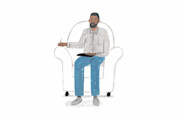I knew there was something wrong with me at ten years old. It started relatively innocuously with the recurring thought that I was going to Hell.
It soon became debilitating. If I spelled a word wrong, it meant I wanted to have sex with Jesus. If I looked at my baby sister in the eyes, that meant that I was a pedophile. These would be intensely disturbing thoughts for anyone, but I was in the fifth grade.
I told my mom, who, in turn, told the elementary school psychologist. After one meeting, the psychologist told me that what I was experiencing was normal, a small bump on the road of puberty, and I’d grow out of it soon enough. This news calmed me, and I settled into waiting patiently to grow out of my intrusive thoughts.
I never did.
Instead, these thoughts grew along with me, and I developed strange behaviors that I believed would “neutralize” the depravity I felt lurked in my brain. If I had what I felt was a “bad thought,” I had to press hard on my neck with my fingers to cut off my airway to counteract it.
If I accidentally made eye contact with my younger sister, I had to blink hard, shake my head, or scratch myself with my nail until it left a mark.
My obsessions multiplied, always related to a “theme” that was important to me: morality, health, my family, my sexuality. My compulsions worsened in kind; I had to perform these compulsions more often and more severely.
When I was 13, I heard about something called obsessive-compulsive disorder (OCD). OCD is characterized by anxiety-producing, unwanted, intrusive thoughts—or obsessions—followed by actions intended to counteract them—compulsions. I learned I wasn’t the only person who felt this way. I learned I had a disorder, a disorder that could be treated with therapy.
If I had what I felt was a “bad thought,” I had to press hard on my neck with my fingers to cut off my airway.
My mom, whom I love, is a Bulgarian immigrant with the unfortunate but culturally typical notion that mental illness is a flaw, and that her children are too perfect to be mentally ill. She denied my pleas for therapy throughout my teen years.

The cycle usually went like this: I would be overcome by a sense of inescapable fear, I would share these feelings with my mom and ask to go therapy, she would say I was making up symptoms for attention, I would cry, and then we would do the whole thing again a year later.
Finally, by my senior year of high school, my mom relented a bit: Once I got to college, I would be allowed to see a campus therapist, but I was not to directly mention OCD. (According to her, I was making that part up.)
I was excited to finally receive what I thought would be “real treatment.” Being denied care over the years had forced me to do the research. I’d become super knowledgeable about my disorder.
I was familiar with how the disorder worked, and I knew that a highly effective treatment for it was ERP, short for exposure and response prevention therapy.
ERP is a type of cognitive-behavior therapy or talk therapy. It is widely used to treat OCD, social anxiety disorder, and other anxiety disorders.
Our brains work in pathways and associations; the goal of ERP is to reroute the pathways in the brain of a person with OCD.
It works to retrain the brain so that instead of associating non-threatening activities with dangerous consequences and implications, (like making eye contact with your sister and thinking “I’m a pedophile”), the brain connects triggering activities with neutral consequences.
This is why attempting to reassure someone with OCD that their anxious behavior is unfounded can be dangerous: It “rewards” their obsessions by using logical thoughts against an illogical disorder, reinforcing the possibility that while their anxiety is wrong this time, it could be correct another time.
This strengthens the sufferer’s belief that one event will lead to a negative event, and pushes them deeper into obsessive thinking.
For anxious OCD sufferers, our obsessions and the danger they imply feel extremely, viscerally real, no matter how irrational they may seem to others, or even to ourselves. Once, for instance, I couldn’t drive because every time I saw a person walking on a sidewalk, I was completely convinced that I had run them over, killed them, and kept driving while they bled out.
ERP works by exposing a person with OCD to the sorts of thoughts, situations, and objects that provoke their anxiety and in turn, their compulsions.
Then, under a therapist’s supervision, the person with OCD learns how to accept those triggers and the associated anxiety instead of attempting to make themselves “feel better” by performing a compulsion—like never driving a car because they’re afraid of killing someone, or only driving on an arbitrary-but-specific handful of streets where the imagined threat feels less immediate. It sounded terrifying, but I felt it was what I needed.

I was glad when I first registered for campus therapy and received my official diagnosis. I was 17, and at that point, OCD was a huge part of my identity. My obsessive thoughts had been consuming my life—my social life, my life decisions, my time—for seven years at that point. I didn’t know who I was without OCD; I was unexpectedly apprehensive to begin therapy.
But it quickly became clear that the campus therapist wasn’t really equipped for this. She printed out an OCD workbook filled with information that I already knew, and halfheartedly guided me through exposures that I, admittedly, also halfheartedly performed.
I didn’t know who I was without OCD.
I stopped seeing her after three months. I realized there was more to therapy than just going. It matters who your therapist is, and what methods they use. You have to trust them, they need to know how to treat you effectively. On top of that, to get help, the money stars have to align such that you can actually afford care.
Those three factors rarely matched up in the subsequent three years I tried to find a therapist who worked for me. I had this idea that an OCD specialist was what I needed, but since my family was on Medicaid, there were essentially no therapists in-network or otherwise affordable.
So I stuck with campus therapy. I warmed up to the idea of finding out who I was behind my mental illness’s big shadow. But, the work being done in my therapy sessions was… lacking. I saw a campus talk therapist who ended her sessions with me every time I wanted to start doing ERP.
Then, convinced that my OCD was too severe for me to continue existing without medication, I saw a campus psychiatrist. He was unfamiliar with OCD and tried to diagnose me with schizophrenia before prescribing me depression medication. I never filled that prescription. Next, I saw a social worker who tried to work through my familial and emotional issues—which was great, but it didn’t help me with my OCD.
My senior year of college, I got extremely lucky. I found Genesee Valley Psychology, a clinic near campus that offered sliding scale payment (this means the rate you pay is commensurate with your income).
At this point, I was 20, a decade into my symptoms, and still experiencing the same severity as I did at their onset. I was afraid, but I was ready to commit myself to therapy.

I still remember one of the first ERP sessions I had with my therapist, a little more than a year ago. I was months-deep into a new obsession with spectral possession, and spent most of my days completely convinced that at any moment, a ghost would possess my body and make me kill my boyfriend.
With this in mind, my therapist helped me record a script, which is a type of exposure that forces you to immerse yourself in an anxiety-producing thought by narrating it.
I recorded a voice note to myself stating that “I told myself that I would be possessed at 12:00 AM. Now, it is 12:01. I’m starting to feel foggy, I can’t control my body. I’m not in control, the devil is inside of me.” A pretty rousing note-to-self, I know.
My therapist had me listen to the recording on a loop for half an hour, pushing me to internalize the words I was hearing, accept the fear I felt, and imagine that the possession that I described, the thing that I agonized over daily with every iota of my body, would undoubtedly come to pass.
Doing the exposure made me so anxious I initially felt lightheaded, but as the 30 minutes crept on, my heart rate began to slow, and my OCD-driven fear started to seem a bit…boring.
My boredom started chipping away at the unalloyed terror that I had always thought was a permanent fixture of my daily life, and I realized that I was capable of getting better. A lot better.
With my therapist’s help and about a year of one-hour-a-day, aggressive ERP, I started to feel something I didn’t know was possible: quiet. A few months after starting ERP, I noticed a stillness in my brain, and I was surprised by how much control I felt, over both my life and my feelings. I hadn’t become a different person after reclaiming my life from my OCD; it was more like sweeping sand off of a seashell: I had been uncovered.
Doing the exposure made me so anxious I initially felt lightheaded.
Dr. Lauren Wadsworth, clinical psychologist and director of Genesee Valley Psychology, knows the limitations of standard therapy for OCD sufferers, and the importance of OCD specialists. "At Genesee Valley Psychology, we have many people come to us after trying talk-therapy or other types of non-ERP therapy for decades with minimal relief," she says.
“OCD can stay stable or get worse with non-ERP therapy for many reasons. Without attempting to approach feared stimuli, the world just gets scarier and scarier, [an OCD sufferer’s] avoidance increases, causing [the world] to also become smaller and smaller.” ERP is entirely focused on approaching these fears.
I hadn’t become a different person after reclaiming my life from my OCD; it was more like sweeping sand off of a seashell: I had been uncovered.
I needed to see an OCD specialist to live a full life. I tried other routes, but OCD is too misunderstood and complicated for those paths to be effective for me. I needed a therapist who knew more than I did, who motivated me, and I needed to push myself, to want to be better.
I still attend weekly therapy and perform exposures every day; mental illness is never “cured” and always requires maintenance. But I’m more able to embrace change now.
American Psychiatric Association. (2013). Diagnostic and statistical manual of mental disorders (5th ed.). Washington, DC: Publisher.
International OCD Foundation. (2018, July 23). Exposure and Response Prevention (ERP). Retrieved from https://iocdf.org/about-ocd/ocd-treatment/erp/
Kohn, K. (2018, December 5). Outsmarting anxiety & OCD. Retrieved from https://www.outsmartingocd.com/blog/ocdthemes






